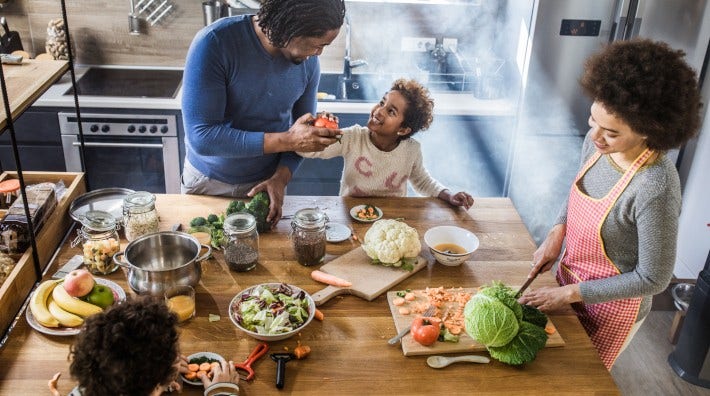Cooking With Your Kids

Holiday time often means children home from school, visits from friends and family, and time spent cooking and eating. It’s a chance to bring kids into the kitchen and start talking about healthy food choices.
Learning to eat healthier is more important than ever. Nearly 1 in 5 children and teens in the US is obese. When children are overweight or obese, it puts them at risk for diseases such as diabetes, heart disease, and even cancer in the future.
Start them young
Even very small children can learn about healthy eating by helping grown-ups prepare meals and snacks. As they get older, they can chip in even more. Before you know it, they’ll be ready to cook whole meals by themselves.
- Preschoolers can fetch ingredients from the refrigerator or pantry and help stir. They can drop fruit chunks into the blender to make a smoothie or sprinkle cheese and vegetables on a homemade whole-wheat crust pizza. Talk to them about how eating right helps your body grow big and strong, and how eating yummy, good-for-you food helps make healthy muscles and bones.
- School-age children can use their math skills by measuring ingredients and use their fine motor skills to crack eggs for an omelet, roll their own lean meatballs, or cut soft fruit with a butter knife. Talk to them about how healthy foods help make the systems in their bodies – including their muscles, heart, and bones – work well, and how healthy bodies now will help make them healthier adults later. Explain that foods that aren’t good for you are an OK treat once in a while but shouldn’t replace the foods their bodies really need.
- Tweens and teens can use a sharper knife and might be ready to use the stove or oven on their own. Let them choose a recipe and take the lead in preparing it, from finding the ingredients at the market to delivering the finished product.
Be careful how you talk about healthy choices with this age group. Studies show that when parents focus on body weight in conversations about health, teens are more likely to diet, go on food binges, and use unhealthy weight-control behaviors. But if parents focus more generally on healthy eating, teens are less likely to try drastic means to lose weight.
The best way to teach children of all ages about eating right is to be a role model: Eat healthy yourself, show that you’re enjoying your food, keep healthy foods in the house, and limit junk food so they have good options at hand.
- Reviewed by

The American Cancer Society medical and editorial content team
Our team is made up of doctors and oncology certified nurses with deep knowledge of cancer care as well as journalists, editors, and translators with extensive experience in medical writing.
American Cancer Society news stories are copyrighted material and are not intended to be used as press releases. For reprint requests, please see our Content Usage Policy.



